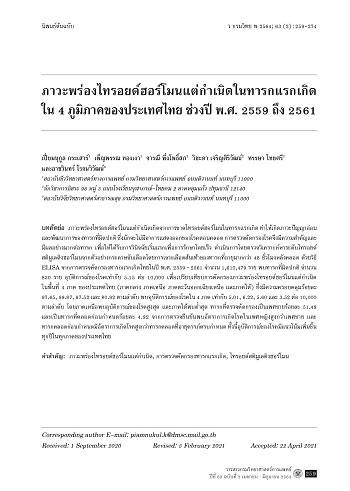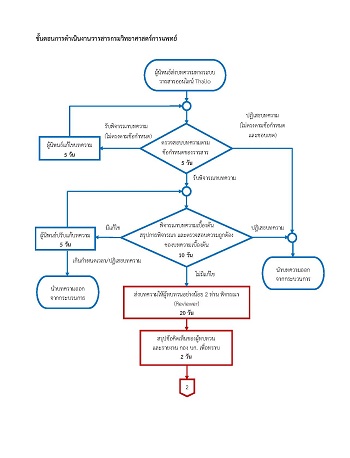ภาวะพร่องไทรอยด์ฮอร์โมนแต่กำเนิดในทารกแรกเกิดใน 4 ภูมิภาคของประเทศไทย ช่วงปี พ.ศ. 2559 ถึง 2561
คำสำคัญ:
ภาวะพร่องไทรอยด์ฮอร์โมนแต่กำเนิด, การตรวจคัดกรองทารกแรกเกิด, ไทรอยด์สติมูเลติงฮอร์โมนบทคัดย่อ
ภาวะพร่องไทรอยด์ฮอร์โมนแต่กำเนิดเกิดจากการขาดไทรอยด์ฮอร์โมนในทารกแรกเกิด ทำให้เกิดภาวะปัญญาอ่อนและพัฒนาการของทารกที่ผิดปกติ ซึ่งมักจะไมมี่อาการแสดงออกของโรคตอนคลอด การตรวจคัดกรองโรคจงึ มีความสำคัญและมีผลอย่างมากต่อทารก เพื่อให้ได้รับการวินิจฉัยเริ่มแรกเพื่อการรักษาโดยเร็ว ดำเนินการโดยตรวจวิเคราะห์หาระดับไทรอยด์สติมูเลติงฮอร์โมนจากตัวอย่างกระดาษซับเลือดโดยการเจาะเลือดส้นเท้าของทารกที่อายุมากกว่า 48 ชั่วโมงหลังคลอด ด้วยวิธี ELISA จากการตรวจคัดกรองทารกแรกเกิดไทยในปี พ.ศ. 2559 - 2561 จำนวน 1,610,479 ราย พบทารกที่ผิดปกติ จำนวน 830 ราย อุบัติการณ์ของโรคเท่ากับ 5.15 ต่อ 10,000 เพื่อเปรียบเทียบการคัดกรองภาวะพร่องไทรอยด์ฮอร์โมนแต่กำเนิดในพื้นที่ 4 ภาค ของประเทศไทย (ภาคกลาง ภาคเหนือ ภาคตะวันออกเฉียงเหนือ และภาคใต้) ซึ่งมีความครอบคลุมร้อยละ 97.65, 99.87, 97.52 และ 80.92 ตามลำดับ พบอุบัติการณ์ของโรคใน 4 ภาค เท่ากับ 5.01, 6.22, 5.60 และ 3.52 ต่อ 10,000 ตามลำดับ โดยภาคเหนือพบอุบัติการณ์ของโรคสูงสุด และภาคใต้พบตํ่าสุด ทารกที่ตรวจคัดกรองเป็นเพศชายร้อยละ 51.49 และเป็นทารกที่คลอดก่อนกำหนดร้อยละ 4.92 จากการตรวจยืนยันพบอัตราการเกิดโรคในเพศหญิงสูงกว่าเพศชาย และทารกคลอดก่อนกำหนดมีอัตราการเกิดโรคสูงกว่าทารกคลอดที่อายุครรภ์ครบกำหนด ทั้งนี้อุบัติการณ์ของโรคมีแนวโน้มเพิ่มขึ้นทุกปีในทุกภาคของประเทศไทย
เอกสารอ้างอิง
Nagasaki K, Minamitani K, Anzo M, Adachi M, Ishii T, Onigata K, et al. Guidelines for mass screening of congenital hypothyroidism (2014 revision). Clin Pediatr Endocrinol 2015; 24(3): 107-33.
LaFranchi SH. Worldwide coverage of newborn screening for congenital hypothyroidism - a public health challenge. US Endocrinol 2014; 10(2): 115-6.
Rastogi MV, LaFranchi SH. Congenital hypothyroidism. Orphanet J Rare Dis 2010; 5: 17. (22 pages).
Yarahmadi SH, Tabibi SJ, Alimohammadzadeh KH, Ainy E, Gooya MM, Mojarrad M, et al. Cost-benefi t and eff ectiveness of newborn screening of congenital hypothyroidism: fi ndings from a national program in Iran. Int J Endocrinol Metab 2010; 8(1): 1-6.
Therrell BL, David-Padilla C. Screening of newborns for congenital hypothyroidism: guidance for developing programmes. Vienna: International Atomic Energy Agency, 2005.
Buyukgebiz A. Newborn screening for congenital hypothyroidism. J Clin Res Pediatr Endocrinol 2013; 5 (Suppl 1): 8-12.
Mehran L, Khalili D, Yarahmadi S, Amouzegar A, Mojarrad M, Ajang N, et al. Worldwide recall rate in newborn screening programs for congenital hypothyroidism. Int J Endocrinol Metab 2017; 15(3): e55451. (12 pages).
Ford G, LaFranchi SH. Screening for congenital hypothyroidism: a worldwide view of strategies. Best Pract Res Clin Endocrinol Metab 2014; 28(2): 175-87.
LaFranchi SH. Increasing incidence of congenital hypothyroidism: some answers, more questions. J Ciln Endocrinol Metab 2011; 96(8): 2395-7.
McGrath N, Hawkes CP, McDonnell CM, Cody D, O'Connell SM, Mayne PD, et al. Incidence of congenital hypothyroidism over 37 years in Ireland. Pediatrics 2018; 142(4): e20181199. (10 pages).
Deng K, He C, Zhu J, Liang J, Li X, Xie X, et al. Incidence of congenital hypothyroidism in China: data from the national newborn screening program, 2013-2015. J Pediatr Endocrinol Metab 2018; 31(6): 601-8.
Heather NL, Derraik JGB, Webster D, Hofman PL. The impact of demographic factors on newborn TSH levels and congenital hypothyroidism screening. Clin Endocrinol (Oxf) 2019; 91(3): 456-63.
Hinton CF, Harris KB, Borgfeld L, Drummond-Borg M, Eaton R, Lorey F, et al. Trends in incidence rates of congenital hypothyroidism related to select demographic factors: data from the United States, California, Massachusetts, New York and Texas. Pediatrics 2010; 125 (Suppl 2): S37-47.
Charoensiriwatana W, Janejai N, Boonwanich W, Krasao P, Chaisomchit S, Waiyasilp S. Neonatal screening program in Thailand. Southeast Asian J Trop Med Public Health 2003; 34(suppl 3): 94-100.
Zimmermann MB. The eff ects of iodine defi ciency in pregnancy and infancy. Paediatr Perinat Epidemiol 2012; 26 (Suppl 1): 108-17.
Aguayo A, Grau G, Vela A, Aniel-Quiroga A, Espada M, Martul P, et al. Urinary iodine and thyroid function in a population of healthy pregnant woman in the North of Spain. J Trace Elem Med Biol 2013; 27(4): 302-6.
Siberry GK, Iannone R. The Harriet Lane handbook: a manual for pediatric house offi cers. 15th ed. St. Louis: Mosby; 2000. p. 219.
ศูนย์ปฏิบัติการตรวจคัดกรองสุขภาพทารกแรกเกิดแห่งชาติ กรมวิทยาศาสตร์การแพทย์. แนวทางในการวินิจฉัยภาวะพร่องฮอร์โมนไทรอยด์แต่กำเนิด. [ออนไลน์]. 2559; [สืบค้น 12 เม.ย. 2560]; [2 หน้า]. เข้าถึงได้จาก: URL: http://www.neoscreen.go.th/web/images/stories/pdf/guide_tsh_f.pdf.
กองยุทธศาสตร์และแผนงาน สำนักงานปลัดกระทรวงสาธารณสุข. สถิติสาธารณสุข พ.ศ. 2561. นนทบุรี: กระทรวงสาธารณสุข; 2562.
Niwa F, Kawai M, Kanazawa H, Iwanaga K, Matsukura T, Hasegawa T, et al. Hyperthyrotropinemia at 2 weeks of age indicates thyroid dysfunction and predicts the occurrence of delayed elevation of thyrotropin in very low birth weight infants. Clin Endocrinol (Oxf) 2012; 77(2): 255-61.
McGrath N, Hawkes CP, Mayne P, Murphy NP. Optimal timing of repeat newborn screening for congenital hypothyroidism in preterm infants to detect delayed thyroid-stimulating hormone elevation. J Pediatr 2019; 205: 77-82.
Kaluarachchi DC, Allen DB, Eickhoff JC, Dawe SJ, Baker MW. Increased congenita hypothyroidism detection in preterm infants with serial newborn screening. J Pediatr 2019; 207: 220-5.




